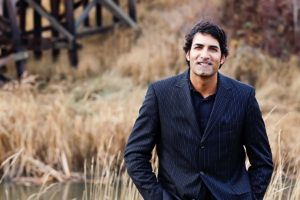Conversations
Stephen Khan – Interview: A T8N exclusive interview
January, 2017
Most residents of St. Albert will remember Stephen Khan as the Progressive Conservative MLA who represented our city from 2012 to 2015. When the New Democratic Party of Alberta swept the election two years ago, Stephen, along with the majority of his PC peers, lost his seat in the legislature. But this province-wide defeat of the Progressive Conservatives didn’t turn him away from politics. He’s currently running for the leadership of the PC party on a platform that he calls “fiscally conservative, but socially progressive.” His goal is to modernize the party by making it more representative of what Alberta looks like today. Last month, we sat down with Stephen to ask him a bit more about his vision for Alberta. Here’s what he had to say.
t8n: Which aspects of your platform do you think will convince St. Albert voters to support you?
 SK: I think that people are used to seeing me being an active member of the community. I’ve lived in St. Albert since 1973, and the people here have a really clear understanding of who I am and what I stand for. St. Albert being St. Albert, if you don’t know me personally, chances are you know at least one person who has interacted with me, whether I went to school with them, coached their kids in hockey, baseball or basketball, or just interacted with them in one of the many community volunteer activities I take part in. There is a level of connectivity with my perspective in St. Albert and a level of familiarity with what I stand for. People here understand my platform more than the other communities that I’ve visited as I travel the province. This is something that I think will become clear throughout our conversation.
SK: I think that people are used to seeing me being an active member of the community. I’ve lived in St. Albert since 1973, and the people here have a really clear understanding of who I am and what I stand for. St. Albert being St. Albert, if you don’t know me personally, chances are you know at least one person who has interacted with me, whether I went to school with them, coached their kids in hockey, baseball or basketball, or just interacted with them in one of the many community volunteer activities I take part in. There is a level of connectivity with my perspective in St. Albert and a level of familiarity with what I stand for. People here understand my platform more than the other communities that I’ve visited as I travel the province. This is something that I think will become clear throughout our conversation.
t8n: You’ve branded yourself as “socially progressive.” What does that mean when it comes to LGBTQ rights in schools?
SK: My barometer on LGBTQ issues when it comes to schools has always been my two children. I have a son who is a recent graduate from Paul Kane and a daughter who is in Grade 10 at Paul Kane right now. When it comes to LGBTQ concerns for them, they’ve really become non-issues. As young people, they often wonder why the government is expending so much time focusing on these issues when the people who are impacted the most—the students—have already moved so far beyond the current governmental conversation that, to them, the issues are already solved.
The overwhelming majority of students want their schools to be a safe and inclusive space for all children. Educators want their students to be in a position where they can succeed. These issues have been resolved by a younger generation, and I’d like to leave them as resolved issues.
t8n: In terms of policy then, would you like to see the government take a more hands-off approach?
SK: I’d like to see the government make sure that there is a level playing field for all Albertans, regardless of who you love or where you play. We’re all equals, and we should all be treated as such. In any instance where people are being made to feel marginalized or threatened, we definitely need to address those issues, and I think that the government has a role there. But when it comes down to questions like, “Does the government belong in the bedrooms of Albertans?” I think that the question was resolved years ago, and the answer was a resounding “No.”
To use my own language, I think that this perspective is a very modern one. There is something that I call “The Myth of the Alberta Redneck” where there is a perception outside of the province that Alberta is full of rednecks. I’m here to tell you, as someone who looks the way I do, as someone who has lived in Alberta from the 70s through to today, that Alberta is a place where it doesn’t matter what you look like or where you’re from. If you work hard, you can have opportunities here. That’s the Alberta way. Albertans,overwhelmingly, dislike intolerance. If you can show up on time, you can find success here. It speaks to the modern values of Albertans, and those values are reflected in my platform of being a modern conservative.
t8n: The federal government’s climate plan closely mirrors the NDP carbon tax here in Alberta. In the face of these restrictions, how would you transition Alberta away from a reliance on the fossil-fuel industry?
SK: I think there are two questions there. One is regarding the NDP version of the carbon tax, which I believe people are really going to start feeling the impacts of early this year. Ultimately, it’s an insincere wealth-transfer.
When I’m leader, we will absolutely do away with it. I truly believe that it’s not effective and that it’s not going to achieve the purposes that it aims to accomplish. That’s my critique.
I’ll say, from a historical perspective, Alberta was one of the very first jurisdictions to put a tax on carbon. I’ve talked to some of the folks who were in the federal government’s Department of Trade at that time, and what they’ve said is that the way we implemented the tax in 2007 didn’t have an adverse effect on the pocketbooks of individuals in Alberta, and it helped both Alberta and Canada from a competitive standpoint. If you look at jurisdictions like British Colombia, who have put a tax on carbon without taxing individuals, you’re seeing much better results. What we need are Alberta-made solutions. We need to come from a standpoint that recognizes that the taxpayer can only be hit so many times.
Anything we do with that carbon tax needs to be based on sound data and sound scientific evidence.
These are the things that we need to talk about, and at the same time, we need to take a page out of the books of places like Saskatchewan, where they are pushing back on the feds and investing in tech that will help reduce their carbon footprint while maximizing their resources. That is an intelligent and practical way to handle things and a value-for-money way to handle things.
To ignore the fact that our economy is driven by the petro-chemical industry is folly. We need to increase the value of industry throughout the province—and not just when it comes to the petro-chemical sector, but in agriculture and forestry as well. In doing so, we can develop technologies that we can use to become global leaders and then export those technologies around the world. Those are the real and tangible ways of diversifying and sustaining our economy at the same time.
t8n: Sandra Jensen crossed the floor, and Donna Kennedy-Glans dropped out of the leadership race due to threats and harassment. How would you address the widespread bullying that’s taking place in Alberta politics?
SK: Bullying on any level is completely unacceptable. We teach our children in school that bullying is unacceptable, and in the workplace there are countless HR manuals being produced that forbid bullying and intimidation. I just can’t fathom how anyone in a leadership position would tolerate bullying in the political arena. Under my leadership, there will be a zero-tolerance for bullying and threats. I spoke with Sandra the day after she dropped out of the leadership race, and it wasn’t just the incident in Red Deer that drove her to her decision. That was just the tip of the iceberg. The harassment was on social media and in public forums. She was just being belittled everywhere, by and large, by one segment of the PC leadership campaign. It has to be declared loud and clear from anyone in a leadership position that bullying tactics are completely unacceptable.
t8n: What, if anything, would you do to change the climate for women in politics?
SK: When it comes to gender equality and women taking on prominent leadership roles in politics, I’ll tell you as a husband, and as a father to a daughter and as somebody who has been surrounded by strong, brilliant and incredibly effective women all his life, this is an issue that needs to be resolved. It’s going to take strong leadership to do so. That comes from building a team that is a reflection of Alberta and the values that Albertans hold. The team that I intend to build will be a younger team. It will be a gender-balanced team. It will be a team that is ethnically diverse and one that fully represents what Alberta looks like in 2017.
The average age of Albertans is 36 years old. In 2015, the PC party completely lost track of that. There was this question going around during the election, “Who are all of these young people that are showing up to vote?” The data will show you that it wasn’t a bunch of university students. This is just what Alberta looks like now. The average Albertan wants to ensure that there is gender equality, that there is an acknowledgement of the LGBTQ community and that there is an embracing of ethnic diversity. Any government that I lead will be a reflection of this modern Alberta and the values that it holds.
t8n: Parallels are being drawn between the openly sexist and hateful behaviour of some of Trump’s supporters and the behaviour of Albertans who chanted “Lock her up” at a rally to protest the Alberta carbon tax. How would you address Albertans who make up this perceived far-right demographic?
SK: What we’re seeing in those examples are an obvious result of a lack of trust between the citizenry and the elected officials. For me, that all starts with re-establishing trust, and I talk about this at every campaign stop. We need to re-establish trust with the 87 constituency associations across the province. There is no other party in Alberta that has as high-functioning constituency boards as the PC party. It begins there. We need to heal our party first and re-establish that trust.
Once we do that, we can go back to the voting populace of Alberta and start rebuilding trust there. Those chants are a reflection of the fact that trust has been broken. It comes back to what I was saying earlier about doing the right thing. Politics doesn’t have to be a game of chess. We can get to a spot where we’re doing the right thing for Albertans.
I’m not naïve enough to think that every single Albertan is going to agree with the decisions that we make, but they should understand why we’re making them, what our motivations are and that we’re really trying to do the right thing.
Once we get to that place politically, a lot of that anger we’re seeing will dissipate, and those issues will subside.
t8n: What is your hope for Albertans, regardless of who leads them?
SK: I’ve been saying this to a lot of people as I tour the province. My sincere hope for Alberta is that our children will continue to have the amazing opportunities that we’ve enjoyed in the past. I want Alberta to be able to take a position of global leadership when it comes to innovation and quality of life—things that we’ve occasionally taken for granted in the past. To me, that’s what this is all about. Getting back to that space where Alberta is the best place in the world to live, work and raise your family. For the first time in a very long time, people are opening their eyes and beginning to question whether or not that is what Alberta will look like in the next 10 or 15 years.
My primary motivation in seeking the PC leadership is that I believe we can get back to the point where we are the envy of the world.
We’ve been that place before, and my hope is that we can get back to being that place.
Want more? For exclusive access to rest of this interview, visit www.t8nmagazine.com and sign up to receive our e-newsletter. In it, Mr. Khan’s answers our questions regarding, Alberta’s minimum-wage increase, the American presidential election, climate change and much more. t8n













